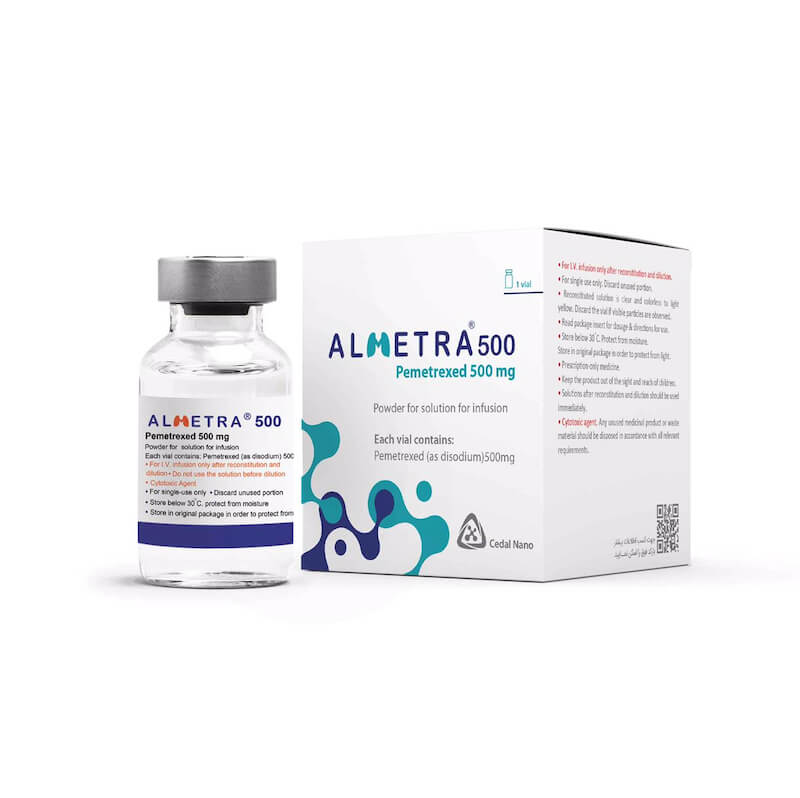– ALMETRA® can suppress bone marrow function as manifested by neutropenia, thrombocytopenia and anaemia (or pancytopenia). Myelosuppression is usually the doselimiting toxicity. Patients should be monitored for myelosuppression during therapy and ALMETRA® should not be given to patients until absolute neutrophil count (ANC) returns to ≥ 1500 cells/mm and platelet count returns to ≥ 100,000 cells/mm . Dose reductions for subsequent cycles are
based on nadir ANC, platelet count and maximum nonhaematologic toxicity seen from the previous cycle.
– Less toxicity and reduction in Grade 3/4 haematologic and nonhaematologic toxicities such as neutropenia, febrile neutropenia and infection with Grade 3/4 neutropenia were reported when pretreatment with folic acid and vitamin B was administered. Therefore, all patients treated with ALMETRA® must be instructed to take folic acid and vitamin B as a prophylactic measure to reduce treatmentrelated toxicity.
– Skin reactions have been reported in patients not pretreated with a corticosteroid. Pretreatment with dexamethasone (or equivalent) can reduce the incidence and severity of skin reactions.
– An insufficient number of patients has been studied with creatinine clearance of below 45 ml/min. Therefore, the use of ALMETRA® in patients with creatinine clearance of < 45 ml/min is not recommended.
– Patients with mild to moderate renal insufficiency (creatinine clearance from 45 to 79 ml/min) should avoid taking nonsteroidal antiinflammatory drugs (NSAIDs) such as ibuprofen, and acetylsalicylic acid (> 1.3 g daily) for 2 days before, on the day of, and 2 days following ALMETRA® administration.
– In patients with mild to moderate renal insufficiency eligible for ALMETRA® therapy NSAIDs with long elimination half lives should be interrupted for at least 5 days prior to, on the day of, and at least 2 days following ALMETRA® administration.
– Serious renal events, including acute renal failure, have been reported with pemetrexed alone or in association with other chemotherapeutic agents. Many of the patients in whom these occurred had underlying risk factors for the development of renal events including dehydration or preexisting hypertension or diabetes. Nephrogenic diabetes insipidus and renal tubular necrosis were also reported in post marketing setting with pemetrexed alone or with other chemotherapeutic agents. Most of these events resolved after pemetrexed withdrawal. Patients should be regularly monitored for acute tubular necrosis, decreased renal function and signs and symptoms of nephrogenic diabetes insipidus (e.g.hypernatraemia).
– The effect of third space fluid, such as pleural effusion or ascites, on pemetrexed is not fully defined. A phase 2 study of pemetrexed in 31 solid tumour patients with stable third space fluid demonstrated no difference in pemetrexed dose normalized plasma concentrations or clearance compared to patients without third space fluid collections. Thus, drainage of third space fluid collection prior to ALMETRA® treatment should be considered, but may not be necessary.
– Due to the gastrointestinal toxicity of pemetrexed given in combination with cisplatin, severe dehydration has been observed. Therefore, patients should receive adequate antiemetic treatment and appropriate hydration prior to and/or after receiving treatment.
– Serious cardiovascular events, including myocardial infarction and cerebrovascular events have been uncommonly reported during clinical studies with pemetrexed, usually when given in combination with another cytotoxic agent. Most of the patients in whom these events have been observed had preexisting cardiovascular risk factors.
– Immunodepressed status is common in cancer patients. As a result, concomitant use of live attenuated vaccines is not recommended.
– ALMETRA® can have genetically damaging effects. Sexually mature males are advised not to father a child during the treatment and up to 3 months thereafter. Contraceptive measures or abstinence are recommended. Owing to the possibility of ALMETRA® treatment causing irreversible infertility, men are advised to seek counselling on sperm storage before starting treatment.
– Women of childbearing potential must use effective contraception during treatment with ALMETRA® and for 6 months following completion of treatment.
– Cases of radiation pneumonitis have been reported in patients treated with radiation either prior, during or subsequent to their pemetrexed therapy. Particular attention should be paid to these patients and caution exercised with use of other radiosensitising agents.
– Cases of radiation recall have been reported in patients who received radiotherapy weeks or years previously.
Precautions:
– ALMETRA® should be administered under the supervision of a qualified physician experienced in the use of antineoplastic agents. Appropriate management of complications is possible only when adequate diagnostic and treatment facilities are readily available.
– As with other potentially toxic anticancer agents, care should be exercised in the handling and preparation of infusion solutions of ALMETRA®.
– The use of gloves is recommended. If a solution of ALMETRA® contacts the skin, wash the skin immediately and thoroughly with soap and water.
– If ALMETRA® contacts the mucous membranes, flush thoroughly with water. Several published guidelines for handling and disposal of anticancer agents are available.
– ALMETRA® is not a vesicant. There is no specific antidote for extravasation of ALMETRA®. It should be managed with local standard practice for extravasation as with other non-vesicants.


